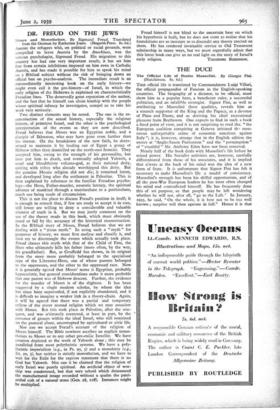DR. FREUD ON THE JEWS
Moses and Monotheism. By Sigmund Freud. Translated
from the German by Katherine Jones. (Hogarth Press. 8s. 6d.) AMONG the refugees whip, on political or racial grounds, were compelled to leave Austria by the Anschluss, was the veteran psychologist, Sigmund Freud. His migration to this country has had one very important result; it has set him free from certain inhibitions imposed on him even in Catholic Austria, and has made it possible for him to speak his mind on a Biblical subject without the risk of bringing down an official ban on psycho-analysis. The immediate result is an extraordinarily interesting book on the early history—we might even call it the pre-history—of Israel, in which the early religion of the Hebrews is explained on characteristically Freudian lines. The deservedly great reputation of the author, and the fact that he himself can claim kinship with the people whose spiritual infancy he investigates, compel us to take his work very seriously.
Two distinct elements may be noted. The one is the re- construction of the actual history, especially the religious history, of primitive Israel, and the other is the psychological interpretation of the events as they are now described. Freud believes that Moses was an Egyptian noble, and a disciple of Ikhnaton, who may have gone even further than his master. On the breakdown of the new faith, he deter- mined to maintain it by leading out of Egypt a group of Hebrew tribes then domiciled on the north-east frontier. They accepted him, owing to the strength of his personality, but later put him to death, and eventually adopted Yahweh, a cruel and bloodthirsty volcano-god, as their national deity, uniting with tribes who already worshipped this deity. But the genuine Mosaic religion did not die; it remained latent, and developed long after the settlement in Palestine. This is then explained by reference to the familiar Freudian psycho- logy—the Hero, Father-murder, neurotic latency, the spiritual advance of mankind through a matriarchate to a patriarchate, much use being made of circumcision.
This is not the place to discuss Freud's position in itself; it is enough to remark that, if few are ready to accept it in tow, still fewer are willing to deny a considerable and valuable element of truth in it. But we may justly comment on the use of the theory made in this book, which must obviously stand or fall by the accuracy of the historical reconstruction. In the Biblical story of Moses, Freud believes that we are dealing with a " pious myth." In using such a " myth " for purposes of history, we must first analyse and classify it, and then try to disentangle the events which actually took place. Freud classes this myth with that of the Child of Fate, the Hero who ultimately kills his father (more often, by the way, his grandfather). But, as Gruffydd has shown, in its original form the story more probably belonged to the specialised type of the Liberator-Hero, one of whose parents belonged to the oppressors, and the other to the oppressed race. Now it is generally agreed that Moses' name is Egyptian, probably hypocoristic, but general considerations make it more probable that one parent was of Hebrew descent. Further, the evidence for the murder of Moses is of the slightest. It has been suggested by a single modern scholar, by whom the idea has since been superseded, if not explicitly abandoned, and it is difficult to imagine a weaker link in a theory-chain. Again, it will be agreed that there was a partial and temporary eclipse of the purer nomad religion which we may associate with Moses. But this took place in Palestine, after the con- quest, and was ultimately corrected, at least in part, by the presence of groups within the ideal Israel, who still remained on the pastoral plane, uncorrupted by agricultural or civic life.
Nor can we accept Freud's account of the religion of Moses himself. The Bible nowhere ascribes an explicit mono- theism to Moses or to any other pre-exilic Israelite. We have creation depicted as the work of Yahweh alone ; this may be paralleled from most polytheistic systems. We have a poly- theistic imperialism (e.g., in Ps. 95, 3) and a monolatry (e.g., Ex. 20, 3), but neither is strictly monotheism, and we have to wait for the Exile for the express statement that there is no God but Yahweh. Nor can it be claimed that the religion of early Israel was purely spiritual. An artificial object of wor- ship was condemned, but that very school which denounced the manufactured image recorded without a qualm the patri- archal cult of a natural stone (Gen. 28, tiff). Instances might be multiplied.
Freud himself is not blind to the uncertain base on which his hypothesis is built, but he does not seem to realise that his foundations are so insecure as to discredit any theory erected on them. He has rendered invaluable service to Old Testament scholarship in many ways, but we must regretfully admit that this latest book can give us no real light on the story of Israel's










































 Previous page
Previous page